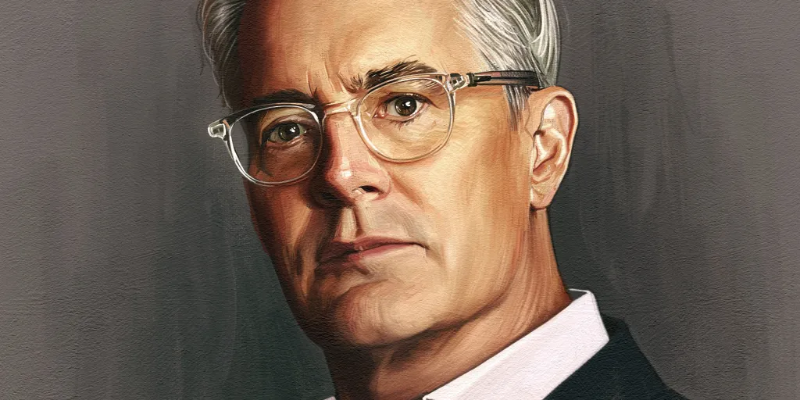
Kyle MacLachlan Keeps Himself Open
This Week on the Talk Easy Podcast with Sam Fragoso
Illustration by Krishna Bala Shenoi.
Talk Easy with Sam Fragoso is a weekly series of intimate conversations with artists, authors, and politicians. It’s a podcast where people sound like people. New episodes air every Sunday, distributed by Pushkin Industries.
*
In celebration of Dune’s 40th anniversary, we have a damn fine cup of coffee with actor (and now podcaster) Kyle MacLachlan.
We discuss his new true crime podcast Varnamtown, MacLachlan’s small-town upbringing, and what inspired him to pursue acting after college before landing his debut role in Dune. Then, he describes the film’s momentous premiere, his second collaboration with David Lynch in Blue Velvet, and the personal challenges he faced while making the film.
On the back-half, we talk through Twin Peaks, Showgirls, how he taps into raw emotion as an actor, his recent foray into social media, and to close, a poignant George Price cartoon.
Subscribe and download the episode, wherever you get your podcasts!
From the episode:
Sam Fragoso: I think your commitment is your greatest gift as a performer. Whether it’s Sex & the City, or Portlandia, or the return of Twin Peaks, you are committed. Through the 2000s, when you were making all this work, you’ve likened your acting process to “a pot of simmering water on the stove.” When you wake up in the morning and have to shoot that day, how do you work yourself into an emotional state?
Kyle MacLachlan: It depends what I need to do for the day. If it’s a scene that is going to require some release, the pot simmering metaphor is sort of correct. I want to keep what’s happening in me— if there are memories that I have, or if it’s a sense of openness that I resisted so much when I was younger. You’re really working on trying to keep the channels open and available.
SF: When did that change for you?
KM: As I matured and started working more, I realized that that’s how to do it.
SF: To excavate memories and repurpose them?
KM: Yes, all of the actor’s tools. There are sense memory techniques, and imagination plays a big part in it. Music helps. At a certain point, it’s the reality of the scene, the moment of the scene— or what’s coming off the other actor can have that impact, if you’re open to it and you allow it.
SF: When we began talking today, we went through this small town that’s at the heart of your new show Varnamtown, which many people have described as a real-life Twin Peaks in North Carolina. From 1994 till about 2015, reporters and fans would always ask, when are you and David Lynch going to work together again? And something you’d say about the role of Agent Cooper is that, “with that character, a really dark ink was used, and I think it needs to fade out a little more until we can come back together.”
KM: Wow, I sound really poetic.
SF: By the time you and Lynch made Twin Peaks: The Return, did you think that dark ink had sufficiently faded? What needed to happen for the two of you to come back together?
KM: The fans that kept reminding us that in the original, we had said, “See you in twenty-five years,” so they were like well, make it happen. There was that. There was also– Mark Frost and David Lynch were in a place where working together again was a possibility. But more than anything, it was the idea. David says he needs to have an idea that then grows. I don’t think he had one that was working until a seed was planted and started to grow, and it kept growing. He always loved Twin Peaks, but the only way he wanted to go back was if he could do it his own way. I was nervous.
SF: Who were you twenty-five years later?
KM: He still had that enthusiasm, there was a sense of boyishness about him…
SF: This is Agent Cooper or Kyle MacLachlan?
KM: This is both.
SF: Where does one end and one begin?
KM: (Laughs) When the coffee runs out. The most challenging role was evil Cooper— or Mr. C (the Doppelganger). I said to David at some point that I didn’t know if I could pull it off.
SF: What did you not think you could pull off?
KM: He’s a psychopath. I fancy myself an empathic person. I like to engage, and I want to know what people are feeling and make sure they’re okay. And I said, “I’ve got to go in and find that.” It was really challenging and satisfying. But it was also a character that I enjoyed taking off at the end of the day. That low boil you talk about, of keeping that energy, that was definitely there.
Talk Easy
Talk Easy with Sam Fragoso is a weekly series of intimate conversations with artists, authors, and politicians. It’s a podcast where people sound like people. New episodes air every Sunday, distributed by Pushkin Industries.



















